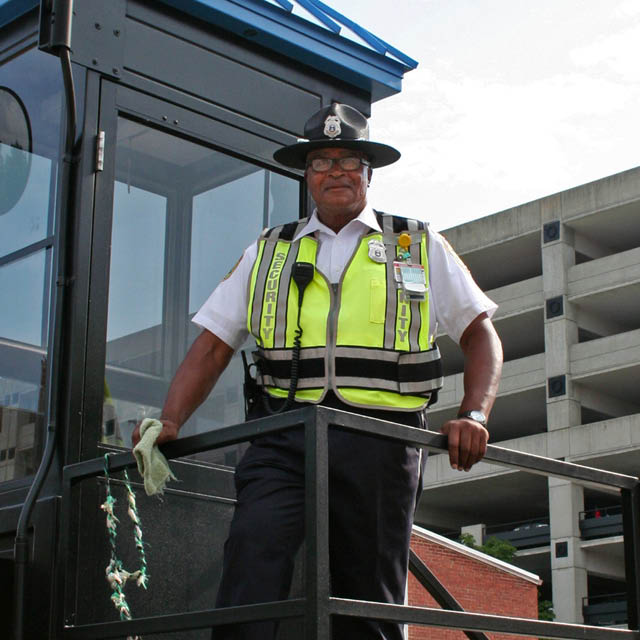THIS MONTH, A NEW SECURITY TEAM will arrive on the East Baltimore campus. Dexo, a Dutch Shepherd, and Bax, a German Shepherd, are the first members of the Johns Hopkins Corporate Security Canine Program. Fresh from an 80-day training program in North Carolina, the canines and their handlers will spend their first weeks at The Johns Hopkins Hospital and the surrounding campus adjusting to their new home. Then, early next year, it’s “paws on the ground.”
The canines, selected for their obedience, work ethic and sociability, will serve as a “deterrent” to crime and additionally be used to detect explosives in suspicious packages. The canine teams are assigned to Corporate Security’s special response unit, which responds to disruptive and aggressive behavior incidents and investigates suspicious packages.
“It’s another tool in our efforts to provide a safe and secure environment for everyone who comes to Johns Hopkins,” says George Economas, senior director of security for The Johns Hopkins Hospital. (Corporate Security responds to 1,300 calls for
aggressive behavior annually, Economas says.) Dexo and Bax will also be on call to bolster security at other Johns Hopkins campuses, should the need arise.
Working on overlapping schedules seven days a week, Dexo and Bax, each about 18 months old, will patrol the Johns Hopkins parking garages, hospital corridors, Emergency Departments and other locations throughout the East Baltimore campus with their handlers, primarily in the evening hours. Kept on lead at all times, the canines will help to prevent potentially volatile confrontations before they occur.
Evidence suggests that the canine program will be successful, says Lisa Allen, chief patient experience officer for Johns Hopkins Medicine. “There’s definitely data that it does keep things calmer. I hope that’s true.”
The canines’ ability to detect explosives will reduce hazards faced by security personnel, who take a calculated risk when opening suspicious packages, Economas says. “This way, we don’t have to open a package. The dog can sniff through and quickly determine whether there are explosives.” Suspicious packages, ranging from a briefcase left by the side of a car in the garage to an unidentified item on the loading dock, are found about once a month, he says. Most of these items are left behind innocently but still have to be treated with caution until determined safe.
Canine security programs are not uncommon in health care settings across the United States, says Bob Wagner, assistant director of Johns Hopkins Corporate Security. Baltimore’s Mercy Medical Center, MedStar Union Memorial Hospital and the University of Maryland Medical Center also have canine security programs.
Dexo and Bax will live at home with their handlers as they become an integral part of the Johns Hopkins community.
–Stephanie Shapiro

